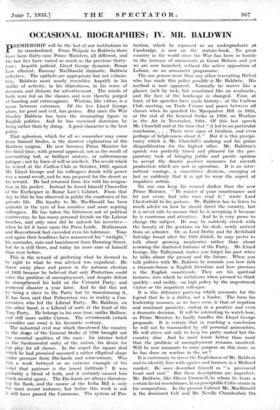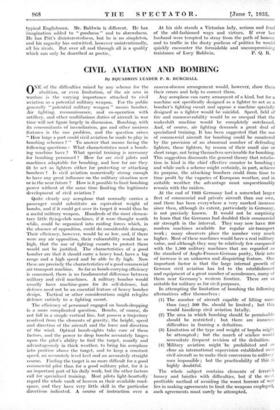OCCASIONAL BIOGRAPHIES: IV. MR. BALDWIN
PREMIERSHIP will be the last of our institutions to be standardized. From Walpole to Baldwin there have been thirty-nine Prime Ministers, all different, and the last five have varied as much as the previous thirty- four ; Asquith judicial, Lloyd George dynamic, Bonar Law efficient, Ramsay MacDonald dramatic, Baldwin reflective. The epithets are appropriate but not exhaus- tive. Baldwin most nearly resembles Asquith in his dislike of activity, in his dilatoriness, in his sense of decorum and distaste for advertisement. The minds of both were fed on the classics and were thereby purged of humbug and extravagance. Wisdom, like virtue, is a mean between extremes. Of the five Lloyd George alone, for good and evil, has genius. But since the War Stanley Baldwin has been the dominating figure in English politics. And he has exercised dominion by being rather than by doing. A good character is the best policy.
That aphorism, which for all we remember may come from Samuel Smiles, is the shortest explanation of the Baldwin enigma. He now becomes Prime Minister for the third time; with general approval, not as the result of unremitting toil, or brilliant oratory, or subterranean intrigue ; not by force of will or intellect. The revolt which he voiced at the Carlton Club in October, 1922, against Mr. Lloyd George and his colleagues drunk with power was a moral revolt, and he was prepared for the desert as his reward. He had returned from Aix with his resigna- tion in his pocket. Instead he found himself Chancellor of the Exchequer in Bonar Law's Cabinet. From that day to this he has observed in public the courtesies of his private life. His loyalty to Mr. MacDonald has been quixotic in the eyes of less sensitive and more aspiring colleagues. He has taken the bitterness out of political controversy, he has many personal friends on the Labour benches, and only once did he unleash his invective— when he let it loose upon the Press Lords. Rothermere and Beaverbrook had exceeded even his tolerance. Time and again their headlines have announced his "twilight," his surrender, ruin and banishment from Downing Street, but he is still there, and today far more sure of himself than ever before.
This is the reward of preferring what he deemed to be right to what he was advised was expedient. He threw away place and power in the autumn election of 1923 because he believed that only Protection could solve the problem of unemployment, and despite defeat he strengthened his hold on the Unionist Party, and retrieved disaster a year later. And he did this not by being a slave to the Party but by transforming it. It has been said that Palmerston was in reality a Con- servative who led the Liberal Party. Mr. Baldwin, on the other hand, is a Liberal of sorts at the head of the Tory Party. He belongs to his own time, unlike Balfour, and still more unlike Curzon. The seventeenth (which resembles our own) is his favourite century: The industrial civil war which threatened the country Hi the she of the General Strike of 1926 brought out the essential qualities of the man : his intense belief in the fundamental unity of the nation, his desire for fair play for all classes. In the sequel the square deal which he had promised assumed a rather elliptical shape under pressure from Die-hands and mine-owners. Was this a weak betrayal or an extreme example of his belief that patience is the truest fortitude ? It was probably a blend of both, and it certainly caused him much mental agony_ The Die-hards arc always threaten- ing his flank, and the course of the India Bill is only the most recent instance, but before this week is out it will have passed the Commons. The system of Pro- tection, which he espoused as an undergraduate at Cambridge, is now on the statute-book. No great country in the world since the War has been so hostile to the increase of armaments as Great Britain and yet we are now launched, without the active opposition of Labour, on an armament programme.
The one person more than any other lexcePting Hitler) who has made this policy possible is Mr. Baldwin. His method is now apparent. Normally he moves like a glacier, inch by inch, but sometimes like an avalanche, and the face of the landscape is changed. Four, at least, of his speeches have made history : at the Carlton Club meeting, on Trade Unions and peace between all classes when he quashed the Macquisten Bill in 1925, at the end of the General Strike in 1926, on Warfare in the Air in November, 1934. Of this last speech Mr. Churchill said at the time that " it led to no particulak conclusion. . . . There were signs of fatalism, and even perhaps of helplessness about it." But it is this precipi- tancy which is Mr. Churchill's undoing and his Prime disqualification for the highest office. Mr. Baldwin's speech was perfectly timed and phrased for the pre- paratory task of bringing public and pacific opinion to accept the drastic positive measures for aircraft production which are now in operation. It is an inter- mittent courage, a cumulative decision, emerging at last so suddenly that it is apt to wear the aspect of impulsive action.
No one can keep his counsel darker than the new Prime Minister. "Be master of your countenance and let not every fool who runs read it," wrote Lord Chesterfield to his godson. Mr. Baldwin has to listen to much advice on how he should direct the country, but it is never safe to assume that he is accepting it because he is courteous and attentive. And he is very prone to change the subject. He may be suddenly struck with the beauty of the gentians on his desk, newly arrived from an admirer. Or, as Lord Derby and Sir Archibald Salvidge found after the 1923 &back, he may prefer to talk about growing raspberries rather than about restoring the shattered fortunes of the Party. Mr. Lloyd George, like Talleyrand, makes you forget his past when he talks about the present and the future. When you talk politics with Mr. Baldwin he reminds you how rich a treasure-house is English literature and how precious is the English countryside. They are his spiritual fastness, into which he withdraws when pressed to think quickly—and rashly—on high policy by the impertinent visitor or the impatient colleague.
It is this defensive parrying which accounts for the legend that he is a drifter, not a leader. The form his leadership assumes, as we have seen, is that of negation and ruminant passivity, ending in a positive and even a dramatic decision. It will be interesting to watch how, as Prime Minister, he finally handles the Lloyd George proposals. It is certain that in reaching a conclusion he will not be trammelled by old personal animosities. He will strive not only to keep his party united but the country also. And he must know better than most that the problem of unemployment remains unsolved. Will he now ruminate to some purpose on this issue, as he has done on warfare in the air ?
It is customary to stress the Englishness of Mr. Baldwin and to identify him with squires and farmers in a Midland market. He once described himself as "a provincial heart and soul." But these descriptions are imperfect. Mr. Baldwin, like Oliver Cromwell, to whom he bears a certain facial resemblance, his a perceptible Celtic strain in his composition. In the present Cabinet Mr. MacDonald is the dominant Celt and Mr. Neville Chamberlain the typical Englishman. Mr. Baldwin is different. He has imagination added to "goodness" and to shrewdness. He has Pitt's disinterestedness, but he is no simpleton, and his sagacity has outwitted, however unintentionally, all his rivals. But over all and through all is a quality which can only be described as poetic.. At his side stands a Victorian lady, serious and fond of the old-fashioned ways and virtues. If ever her husband were tempted to stray from the path of honour and to traffic in the dusty purlieus of politics he would quickly encounter the formidable and uncompromising resistance of Lucy Baldwin. P. Q. R.











































 Previous page
Previous page